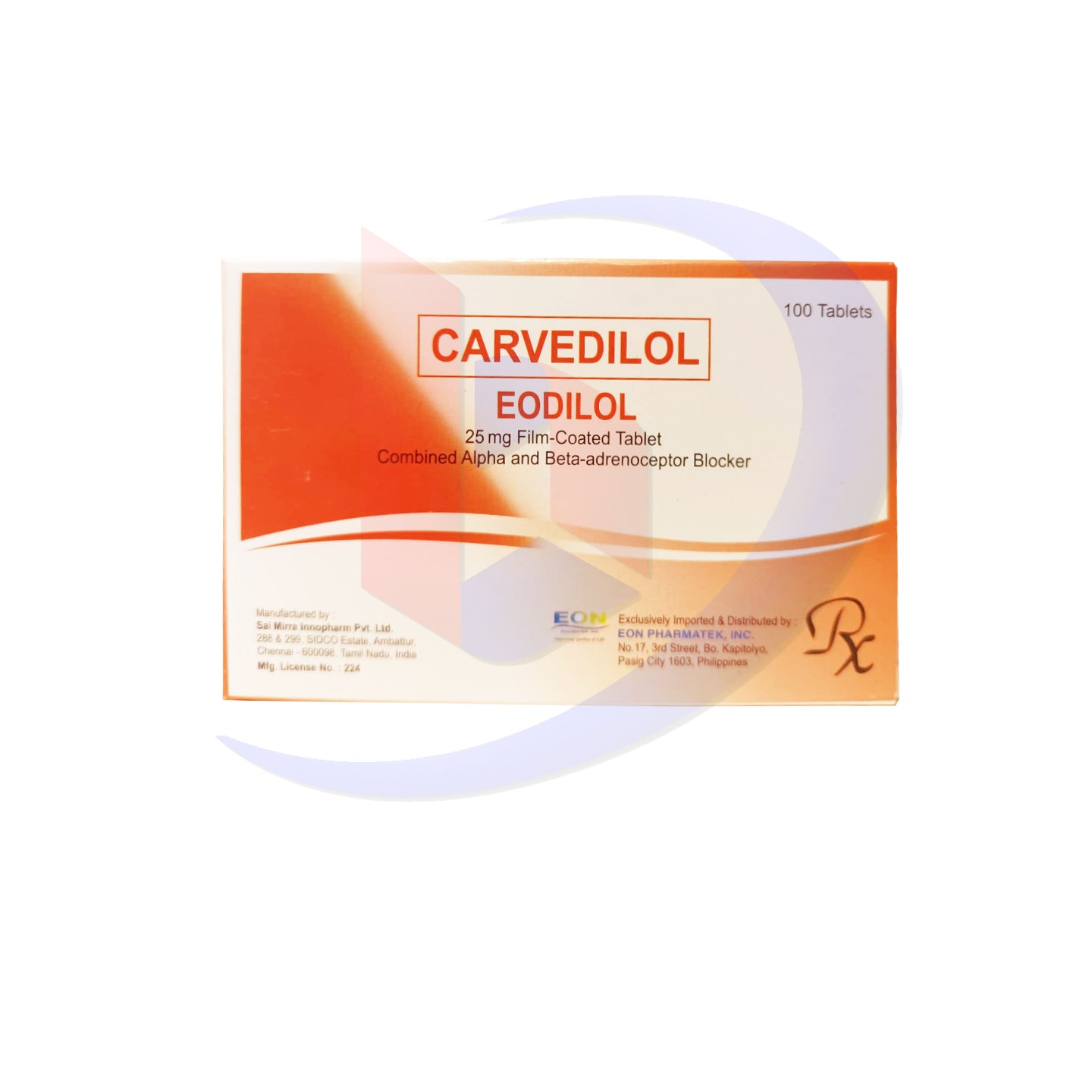Bambang Pharmaceutical Depot Inc.
Carvedilol (Eodilol) 25mg Film Coated Tablet 100's
Carvedilol (Eodilol) 25mg Film Coated Tablet 100's
Couldn't load pickup availability
Certainly! Here is the detailed information for Carvedilol (Eodilol) 25mg Film Coated Tablet 100's:
Product Description:
Carvedilol (Eodilol) is a non-selective beta-blocker and alpha-1 blocker used to treat various cardiovascular conditions. It works by blocking the action of certain chemicals in the body that affect the heart and blood vessels. This results in lowering blood pressure, reducing heart rate, and improving heart function. Carvedilol is often used in the treatment of hypertension and heart failure, as well as to prevent further complications related to cardiovascular diseases.
The medication comes in the form of 25mg film-coated tablets, typically packaged in 100 tablets per bottle.
Indications:
Carvedilol (Eodilol) is primarily indicated for the following conditions:
-
Hypertension (High Blood Pressure):
-
Carvedilol is used to lower high blood pressure, which helps reduce the risk of stroke, heart attack, and kidney damage.
-
-
Heart Failure (Congestive Heart Failure):
-
Carvedilol is used to improve heart function and reduce the risk of hospitalization and death in patients with chronic heart failure. It works by decreasing the heart's workload, improving blood flow, and reducing symptoms of heart failure such as shortness of breath.
-
-
Post-Myocardial Infarction (Post-Heart Attack):
-
Carvedilol is used to improve survival and prevent further heart complications following a heart attack. It helps by improving the heart's ability to pump blood and reducing the workload on the heart.
-
-
Left Ventricular Dysfunction:
-
Carvedilol is used in patients with left ventricular dysfunction, either following a heart attack or in the presence of heart failure, to improve heart function and prevent deterioration of the condition.
-
-
Angina Pectoris:
-
Although less commonly, Carvedilol can be used to treat angina (chest pain) by reducing the oxygen demand of the heart.
-
Dosage:
The recommended dosage for Carvedilol (Eodilol) depends on the specific condition being treated and individual patient factors:
-
Hypertension (High Blood Pressure):
-
Starting dose: Typically 12.5mg once daily for the first 2 days.
-
Maintenance dose: After 2 days, the dose may be increased to 25mg once daily. Some patients may require doses up to 50mg daily (divided into two doses).
-
-
Heart Failure (Chronic Heart Failure):
-
Starting dose: Typically 3.125mg twice daily.
-
Titration: The dose can be gradually increased every 2 weeks, with the goal of reaching 25mg twice daily for patients with a body weight of less than 85kg. For patients weighing more than 85kg, the target dose may be up to 50mg twice daily.
-
-
Post-Myocardial Infarction (Post-Heart Attack):
-
Starting dose: Typically 6.25mg twice daily for the first 2 days.
-
Titration: After 2 days, the dose may be increased to 12.5mg twice daily, and then to 25mg twice daily, depending on the patient's tolerance.
-
-
Left Ventricular Dysfunction:
-
The starting dose and titration process are similar to the dosage for heart failure, starting at 3.125mg twice daily and increasing gradually to 25mg to 50mg twice daily, depending on the patient's weight and response.
-
Administration:
-
Carvedilol should be taken with food to reduce the risk of orthostatic hypotension (a sudden drop in blood pressure when standing up).
-
Tablets should be swallowed whole, not chewed or crushed.
Side Effects:
Like all medications, Carvedilol (Eodilol) may cause side effects, although not everyone experiences them. Common and serious side effects include:
Common Side Effects:
-
Dizziness or lightheadedness, especially when standing up quickly (due to the lowering of blood pressure).
-
Fatigue or tiredness.
-
Headache.
-
Diarrhea or nausea.
-
Bradycardia (slow heart rate).
-
Peripheral edema (swelling of the feet, ankles, or legs).
Serious Side Effects:
-
Severe allergic reactions: Symptoms may include swelling of the face, lips, tongue, or throat, difficulty breathing, or rash.
-
Heart block or worsening heart failure: In some cases, Carvedilol can exacerbate heart failure or cause a significant slowing of the heart rate, requiring medical attention.
-
Bronchospasm: Carvedilol may cause narrowing of the airways, leading to symptoms such as wheezing, shortness of breath, or coughing, particularly in patients with asthma or chronic obstructive pulmonary disease (COPD).
-
Liver problems: Symptoms of liver dysfunction include yellowing of the skin or eyes (jaundice), dark urine, or persistent abdominal pain.
-
Severe hypotension: Symptoms include dizziness, fainting, and confusion.
If you experience any of these serious side effects, seek immediate medical attention.
Contraindications:
Carvedilol (Eodilol) is contraindicated in the following conditions:
-
Hypersensitivity to Carvedilol or other beta-blockers: If you have an allergy to Carvedilol or similar drugs, you should not take this medication.
-
Severe Bradycardia (slow heart rate): Carvedilol can further lower heart rate, so it is contraindicated in individuals with heart rates less than 50 beats per minute.
-
Heart Block (2nd or 3rd degree): Carvedilol is contraindicated in patients with heart block unless they have a functioning pacemaker.
-
Severe liver impairment: If you have severe hepatic disease, Carvedilol should be avoided, as it may increase drug levels to unsafe levels in the body.
-
Cardiogenic shock: Carvedilol should not be used in patients with cardiogenic shock (a condition where the heart is unable to pump enough blood to meet the body's needs).
-
Asthma or severe chronic obstructive pulmonary disease (COPD): Carvedilol can cause bronchospasm and worsen breathing difficulties in these patients.
-
Hypotension (Low Blood Pressure): Patients with severe hypotension should not take Carvedilol as it may lower blood pressure further.
Precautions:
-
Caution in patients with diabetes: Carvedilol may mask some of the symptoms of low blood sugar (hypoglycemia), such as tremors and rapid heartbeat, making it more difficult for diabetic patients to notice low blood sugar levels.
-
Caution in patients with peripheral vascular disease: Beta-blockers like Carvedilol may worsen symptoms of poor circulation, especially in the extremities.
-
Caution in patients with thyroid disorders: Carvedilol may mask the symptoms of hyperthyroidism (overactive thyroid).
-
Liver function monitoring: For patients with mild liver dysfunction, Carvedilol may need to be used cautiously, and liver function should be monitored regularly.
-
Tapering the dosage: Carvedilol should not be abruptly stopped, as this may lead to exacerbation of angina or worsening heart failure. The dose should be gradually tapered under the supervision of a healthcare provider.
Drug Interactions:
Carvedilol (Eodilol) may interact with several other medications, including:
-
Other antihypertensive medications: When used with other blood pressure-lowering agents (e.g., ACE inhibitors, diuretics, calcium channel blockers), the blood pressure-lowering effect of Carvedilol can be enhanced, increasing the risk of hypotension.
-
Antiarrhythmic drugs (e.g., amiodarone, digoxin): These drugs may increase the risk of bradycardia (slow heart rate) when taken with Carvedilol.
-
Insulin and oral antidiabetic agents: Carvedilol may mask symptoms of hypoglycemia, making it more difficult for patients to detect low blood sugar levels.
-
Cimetidine (H2 blocker): Cimetidine can increase the plasma concentration of Carvedilol, leading to increased risk of side effects.
-
Clonidine (a central alpha-2 agonist): Carvedilol may interact with clonidine, causing a rebound increase in blood pressure if clonidine is stopped suddenly.
Summary:
Carvedilol (Eodilol) is a non-selective beta-blocker and alpha-1 blocker used primarily to treat hypertension, heart failure, and post-myocardial infarction. It works by reducing heart rate, lowering blood pressure, and improving heart function.
The usual starting dose for hypertension is 12.5mg once daily, with a possible increase to 25mg once daily. For heart failure, the starting dose is 3.125mg twice daily, with gradual titration.
Common side effects include dizziness, fatigue, bradycardia, and peripheral edema. Serious side effects include liver problems, bronchospasm, and severe hypotension. Carvedilol is contraindicated in patients with severe bradycardia, heart block, liver impairment, and cardiogenic shock.
Always follow your healthcare provider's instructions and inform them of any other medications you are taking to avoid interactions.
Share

Product Features
Highlights
Details
Lot #
Expiry Date
"For All Your Pharma And Medical Supply Needs"
-
MEDICINES
We offer large range of generics and branded tablets, capsules, topicals, suppositories, drops or suspensions, inhalers and injections.
-
SUPPLEMENTS
High quality yet very affordable vitamins and minerals, specialty supplements, herbals and botanicals, sports nutrition, and weight management.
-
MEDICAL SUPPLIES
We serve all types of medical supplies needed in clinics, laboratories, and hospitals like cottons, gauze, alcohol, swabs, gloves, bandages, lancets, glucometer, etc.
-
MEDICAL EQUIPMENT
We also serve durable and affordable medical devices and equipment needed in clinics, laboratories and hospitals.
Subscribe to our emails
Be the first to know about new collections and exclusive offers of Bambang Pharmaceutical Depot Inc.


